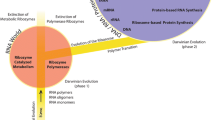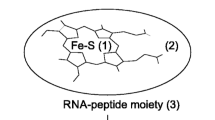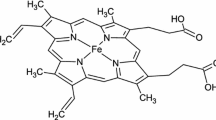Abstract
The ability to encode and convert heritable information into molecular function is a defining feature of life as we know it. The conversion of information into molecular function is performed by the translation process, in which triplets of nucleotides in a nucleic acid polymer (mRNA) encode specific amino acids in a protein polymer that folds into a three-dimensional structure. The folded protein then performs one or more molecular activities, often as one part of a complex and coordinated physiological network. Prebiotic systems, lacking the ability to explicitly translate information between genotype and phenotype, would have depended upon either chemosynthetic pathways to generate its components—constraining its complexity and evolvability— or on the ambivalence of RNA as both carrier of information and of catalytic functions—a possibility which is still supported by a very limited set of catalytic RNAs. Thus, the emergence of translation during early evolutionary history may have allowed life to unmoor from the setting of its origin. The origin of translation machinery also represents an entirely novel and distinct threshold of behavior for which there is no abiotic counterpart—it could be the only known example of computing that emerged naturally at the chemical level. Here we describe translation machinery’s decoding system as the basis of cellular translation’s information-processing capabilities, and the four operation types that find parallels in computer systems engineering that this biological machinery exhibits.
Similar content being viewed by others
References
Adami C (2012) The use of information theory in evolutionary biology. Ann Ny Acad Sci 1256:49–65. https://doi.org/10.1111/j.1749-6632.2011.06422.x
Bernhardt HS (2012) The RNA world hypothesis: the worst theory of the early evolution of life (except for all the others)a. Biol Direct 7:23–23. https://doi.org/10.1186/1745-6150-7-23
Błażej P, Wnętrzak M, Mackiewicz D, Mackiewicz P (2018) Optimization of the standard genetic code according to three codon positions using an evolutionary algorithm. Plos One 13:e0201715. https://doi.org/10.1371/journal.pone.0201715
Breaker RR (2018) Riboswitches and translation control. Csh Perspect Biol 10:a032797. https://doi.org/10.1101/cshperspect.a032797
Cuevas-Zuviría B, Fer E, Adam ZR, Kaçar B (2023) The modular biochemical reaction network structure of cellular translation. Biorxiv. https://doi.org/10.1101/2023.01.21.524914
de Pouplana LR (2020) The evolution of aminoacyl-tRNA synthetases: From dawn to LUCA. Enzym 48:11–37. https://doi.org/10.1016/bs.enz.2020.08.001
Fer E, McGrath KM, Guy L et al (2022) Early divergence of translation initiation and elongation factors. Protein Sci 31:e4393. https://doi.org/10.1002/pro.4393
Fournier GP, Alm EJ (2015) Ancestral reconstruction of a Pre-LUCA Aminoacyl-tRNA synthetase ancestor supports the late addition of Trp to the genetic code. J Mol Evol 80:171–185. https://doi.org/10.1007/s00239-015-9672-1
Fournier GP, Andam CP, Alm EJ, Gogarten JP (2011) Molecular evolution of aminoacyl trna synthetase proteins in the early history of life. Origins Life Evol B 41:621–632. https://doi.org/10.1007/s11084-011-9261-2
Fujishima K, Kanai A (2014) tRNA gene diversity in the three domains of life. Front Genet 5:142. https://doi.org/10.3389/fgene.2014.00142
Goldman AD, Horst JA, Hung L-H, Samudrala R (2012) Evolution of the Protein Repertoire. In: Meyers R (ed) Systems Biology. Wiley-VCH, Wienheim, Germany, pp 207–237. https://doi.org/10.1002/3527600906.mcb.200400157.pub2
Goldman AD, Beatty JT, Landweber LF (2016) The TIM barrel architecture facilitated the early evolution of protein-mediated metabolism. J Mol Evol 82:17–26. https://doi.org/10.1007/s00239-015-9722-8
Goldman AD, Kacar B (2021) Cofactors are remnants of life’s origin and early evolution. J Mol Evol 89:127–133
Haig D, Hurst LD (1991) A quantitative measure of error minimization in the genetic code. J Mol Evol 33:412–417. https://doi.org/10.1007/bf02103132
Itzkovitz S, Alon U (2007) The genetic code is nearly optimal for allowing additional information within protein-coding sequences. Genome Res 17:405–412. https://doi.org/10.1101/gr.5987307
Jiang Y, Neti SS, Sitarik I et al (2022) How synonymous mutations alter enzyme structure and function over long timescales. Nat Chem. https://doi.org/10.1038/s41557-022-01091-z
Joyce (1994) In Origins of life: The central concepts. In: Fleischaker GR (ed) Deamer DW. Jones and Bartlett, Boston, pp xi–xii
Kempes CP, Wolpert D, Cohen Z, Prez-Mercader J (2017) The thermodynamic efficiency of computations made in cells across the range of life. Philosoph Trans Royal Soc Math Phys Eng Sci 375:20160343. https://doi.org/10.1098/rsta.2016.0343
Koonin EV, Novozhilov AS (2016) Origin and evolution of the universal genetic code. Annu Rev Genet 51:1–18. https://doi.org/10.1146/annurev-genet-120116-024713
Křížek M, Křížek P (2012) Why has nature invented three stop codons of DNA and only one start codon? J Theor Biology 304:183–187. https://doi.org/10.1016/j.jtbi.2012.03.026
Labella AL, Opulente DA, Steenwyk JL, Hittinger CT, Rokas A (2019) Variation and selection on codon usage bias across an entire subphylum. PLoS Genet 15(7):e1008304
Lehmann J, Libchaber A (2008) Degeneracy of the genetic code and stability of the base pair at the second position of the anticodon. RNA 14:1264–1269. https://doi.org/10.1261/rna.1029808
Liu Y (2020) A code within the genetic code: codon usage regulates co-translational protein folding. Cell Commun Signal 18:145. https://doi.org/10.1186/s12964-020-00642-6
Milón P, Rodnina MV (2012) Kinetic control of translation initiation in bacteria. Crit Rev Biochem Mol 47:334–348. https://doi.org/10.3109/10409238.2012.678284
Nirenberg M, Caskey T, Marshall R et al (1966) The RNA code and protein synthesis. Cold Spring Harb Sym 31:11–24. https://doi.org/10.1101/sqb.1966.031.01.008
Novoa EM, de Pouplana LR (2012) Speeding with control: codon usage, tRNAs, and ribosomes. Trends Genet 28:574–581. https://doi.org/10.1016/j.tig.2012.07.006
Petrov AS, Gulen B, Norris AM et al (2015) History of the ribosome and the origin of translation. Proc National Acad Sci 112:15396–15401. https://doi.org/10.1073/pnas.1509761112
Pust M, Timmis KN, Tümmler B (2022) Bacterial tRNA landscape revisited. Environ Microbiol 24:2890–2894. https://doi.org/10.1111/1462-2920.16033
Rodnina MV, Wintermeyer W (2001) Fidelity of aminoacyl-tRNA selection on the ribosome: kinetic and Structural Mechanisms. Annu Rev Biochem 70:415–435. https://doi.org/10.1146/annurev.biochem.70.1.415
Schrödinger E (1944) What is Life? The Physical Aspect of the Living Cell. Cambridge University Press. https://doi.org/10.1017/cbo9781139644129
Shannon CE (1948) A mathematical theory of communication. Bell Syst Technical J 27:379–423. https://doi.org/10.1002/j.1538-7305.1948.tb01338.x
Shiba K, Motegi H, Schmimmel P (1997) Maintaining genetic code through adaptations of tRNA synthetases to taxonomic domains. Trends Biochem Sci 22:453–457. https://doi.org/10.1016/s0968-0004(97)01135-3
Sonnerbon TM (1965) Evolving Genes and Proteins. Academic Press. https://doi.org/10.1016/b978-1-4832-2734-4.50034-6
Starosta AL, Lassak J, Jung K, Wilson DN (2014) The bacterial translation stress response. Fems Microbiol Rev 38:1172–1201. https://doi.org/10.1111/1574-6976.12083
Taylor FJR, Coates D (1989) The code within the codons. Biosystems 22:177–187. https://doi.org/10.1016/0303-2647(89)90059-2
Tessera M (2018) Is pre-Darwinian evolution plausible? Biol Direct 13:18. https://doi.org/10.1186/s13062-018-0216-7
Timsit Y, Sergeant-Perthuis G, Bennequin D (2021) Evolution of ribosomal protein network architectures. Sci Rep-Uk 11:625. https://doi.org/10.1038/s41598-020-80194-4
Vasas V, Szathmáry E, Santos M (2010) Lack of evolvability in self-sustaining autocatalytic networks constraints metabolism-first scenarios for the origin of life. Proc National Acad Sci 107:1470–1475. https://doi.org/10.1073/pnas.0912628107
Wills PR, Nieselt K, McCaskill JS (2015) Emergence of Coding and its Specificity as a physico-informatic problem. Origins Life Evol B 45:249–255. https://doi.org/10.1007/s11084-015-9434-5
Wolf YI, Koonin EV (2007) On the origin of the translation system and the genetic code in the RNA world by means of natural selection, exaptation, and subfunctionalization. Biol Direct 2:14–14. https://doi.org/10.1186/1745-6150-2-14
Yacoubi BE, Bailly M, de Crécy-Lagard V (2012) Biosynthesis and Function of Posttranscriptional Modifications of Transfer RNAs. Genetics 46:69–95. https://doi.org/10.1146/annurev-genet-110711-155641
Zhirnov VV, Cavin RK (2013) Future Microsystems for Information Processing: Limits and Lessons From the Living Systems. Ieee J Electron Devi 1:29–47. https://doi.org/10.1109/jeds.2013.2258631
Acknowledgements
Funding was provided by the John Templeton Foundation Grant #61926 and Margarita Salas Fellowship (Recualifica program) of the Universidad Politécnica de Madrid, funded by the NextGenerationEU, European Commission.
Author information
Authors and Affiliations
Corresponding author
Additional information
Handling editor: David Liberles.
Rights and permissions
Springer Nature or its licensor (e.g. a society or other partner) holds exclusive rights to this article under a publishing agreement with the author(s) or other rightsholder(s); author self-archiving of the accepted manuscript version of this article is solely governed by the terms of such publishing agreement and applicable law.
About this article
Cite this article
Cuevas-Zuviría, B., Adam, Z.R., Goldman, A.D. et al. Informatic Capabilities of Translation and Its Implications for the Origins of Life. J Mol Evol 91, 567–569 (2023). https://doi.org/10.1007/s00239-023-10125-0
Received:
Accepted:
Published:
Issue Date:
DOI: https://doi.org/10.1007/s00239-023-10125-0




